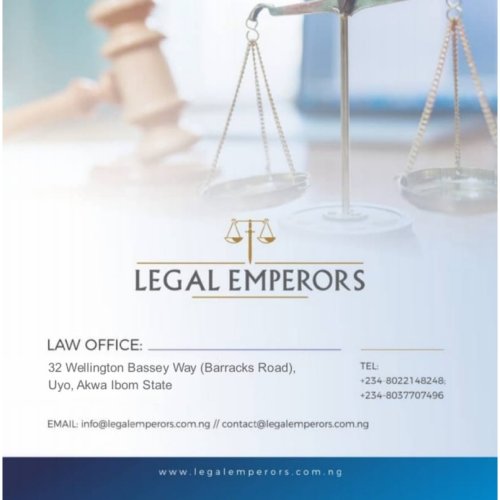Best Administrative Lawyers in Uyo
Share your needs with us, get contacted by law firms.
Free. Takes 2 min.
List of the best lawyers in Uyo, Nigeria
About Administrative Law in Uyo, Nigeria
Administrative law in Uyo, as with the rest of Nigeria, involves the body of law that regulates governmental administrative agencies. It encompasses the procedures under which these agencies operate, as well as the external review of their decisions. This can involve a variety of issues from the issuance of licenses to the enforcement of regulatory standards. As Uyo is a capital city in the Akwa Ibom state of Nigeria, it has its own unique set of administrative structures and regulations that operate alongside federal laws.
Why You May Need a Lawyer
There are several common situations where individuals or businesses in Uyo may require legal assistance in administrative matters. These include, but are not limited to, contesting a government decision regarding personal or property rights, regulatory compliance and disputes for businesses, challenges to zoning or land-use decisions, procurement and contracting disputes, and appealing disciplinary actions by professional regulatory bodies. An administrative lawyer can help navigate the complexities of administrative procedures and improve the chance of favorable outcomes.
Local Laws Overview
Local laws in Uyo are particularly relevant to administrative processes at the state and municipal levels. They may cover areas such as business permits and licensing, environmental regulations, educational policies, public health orders, and local tax regulations. Additionally, local administrative law is also concerned with the functions of local government bodies, their decisions, and how those decisions are made. It is crucial for residents and businesses in Uyo to comprehend these laws to ensure compliance and understand their rights under administrative law.
Frequently Asked Questions
What is an administrative tribunal?
An administrative tribunal is a body established to adjudicate on disputes relating to the exercise of public power by governmental bodies. They provide a more specialized and often expedited means of review compared to traditional courts.
How can I challenge a decision made by a government agency?
To challenge a government decision, you typically must first exhaust all available administrative remedies, such as appeals or reviews within the agency. Following this, you may seek judicial review from a higher court if you believe the decision was unlawful or unreasonable.
What does it mean to exhaust administrative remedies?
Exhausting administrative remedies means you must go through all the procedural steps and appeals provided by the administrative agency before you can take the matter to court. This is usually a prerequisite for judicial review.
How do I file a complaint against a government official in Uyo?
You can file a complaint against a government official through the appropriate channels within the agency they work for. If the issue is not resolved, you can escalate it to higher authorities such as the State Public Complaint Commission or potentially seek legal action.
What are the time limits for seeking judicial review?
Time limits can vary depending on the legal context and the type of decision being challenged. It's important to seek legal advice promptly to ensure you file your application within the statutory time frame.
What is the role of the Federal High Court in administrative law?
The Federal High Court in Nigeria has jurisdiction to hear cases related to administrative actions by federal agencies and some other specific cases outlined in the Nigerian constitution or federal laws.
Can administrative decisions be appealed?
Yes, many administrative decisions can be appealed within the agency, and potentially in the courts, subject to certain conditions such as timelines and the nature of the decision.
How do administrative laws protect citizens?
Administrative laws protect citizens by ensuring that government agencies operate within their legal boundaries and observe fair procedures. These laws also provide mechanisms for review and redress when a person's rights or interests are adversely affected by administrative action.
Do I need a lawyer to engage with administrative agencies?
While not always legally required, having a lawyer can be highly beneficial due to the complexity of administrative law and the need to effectively navigate the system. Lawyers familiar with local administrative procedures can offer valuable advice and represent your interests.
What kinds of regulations do administrative bodies in Uyo enforce?
Administrative bodies in Uyo may enforce regulations related to city planning, business licensing, environmental protection, public health, education, taxation, and more. These regulations often reflect local needs and priorities.
Additional Resources
For individuals seeking additional resources in administrative law within Uyo, the Akwa Ibom State Ministry of Justice can provide guidance. Additionally, the Legal Aid Council is available to those who may require free legal assistance, and the Nigerian Bar Association has branches that may offer resources or referrals to qualified administrative law attorneys.
Next Steps
If you require legal assistance in administrative law, the next step is to consult with a lawyer who specializes in this field. It's advisable to prepare any relevant documentation and be aware of any pertinent timelines or deadlines before your consultation. Legal professionals with experience in administrative law in Uyo will be able to guide you through the process and help protect your interests.
Lawzana helps you find the best lawyers and law firms in Uyo through a curated and pre-screened list of qualified legal professionals. Our platform offers rankings and detailed profiles of attorneys and law firms, allowing you to compare based on practice areas, including Administrative, experience, and client feedback.
Each profile includes a description of the firm's areas of practice, client reviews, team members and partners, year of establishment, spoken languages, office locations, contact information, social media presence, and any published articles or resources. Most firms on our platform speak English and are experienced in both local and international legal matters.
Get a quote from top-rated law firms in Uyo, Nigeria — quickly, securely, and without unnecessary hassle.
Disclaimer:
The information provided on this page is for general informational purposes only and does not constitute legal advice. While we strive to ensure the accuracy and relevance of the content, legal information may change over time, and interpretations of the law can vary. You should always consult with a qualified legal professional for advice specific to your situation.
We disclaim all liability for actions taken or not taken based on the content of this page. If you believe any information is incorrect or outdated, please contact us, and we will review and update it where appropriate.











